Trails of a Legacy
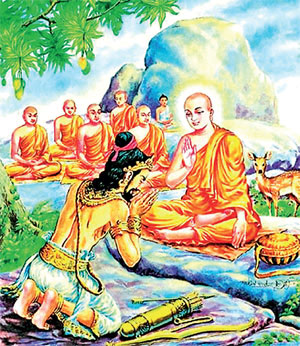 After the death of his son, known by the name of Mutasiva, the son of Suvannapali succeeded him in the government, which was (then) in a peaceful state. The king laid out the beautiful Mahameghavanagarden, rich in all the good qualities that its name promises and provided with fruit-trees and flowering- trees. At the time that the place was chosen for the garden, a great cloud, gathering at an unwonted season, poured forth rain; therefore they called the garden Mahameghavana. Sixty years king Mutasiva reigned in splendid Anuradhapura, the fair face of the land of Lanka. He had ten sons, each thoughtful of the other’s welfare, and two daughters equal in beauty and worthy of their family. The second son, k n ow n by t h e n a m e Devanampiyatissa, was foremost among all his brothers in virtue and intelligence.
After the death of his son, known by the name of Mutasiva, the son of Suvannapali succeeded him in the government, which was (then) in a peaceful state. The king laid out the beautiful Mahameghavanagarden, rich in all the good qualities that its name promises and provided with fruit-trees and flowering- trees. At the time that the place was chosen for the garden, a great cloud, gathering at an unwonted season, poured forth rain; therefore they called the garden Mahameghavana. Sixty years king Mutasiva reigned in splendid Anuradhapura, the fair face of the land of Lanka. He had ten sons, each thoughtful of the other’s welfare, and two daughters equal in beauty and worthy of their family. The second son, k n ow n by t h e n a m e Devanampiyatissa, was foremost among all his brothers in virtue and intelligence.
King Devanampiya Tissa (306BC – 266BC)
Devanampiya Tissa became king after his father’s death. Even at the time of his consecration many wonders came to pass. In the whole isle of Lanka treasures and jewels that had been buried deep rose up to the surface of the earth. Jewels which had been in ships wrecked near Lanka and those which were naturally formed there (in the ocean) issued forth upon the land. At the foot of the Chata-mountain there grew up three bamboo-stems, in girth even as a waggon-pole. One of them, ‘the creeper-stem,’ shone like silver; on this might be seen delightful creepers gleaming with a golden colour. But one was the ‘flower-stem’, on this again might be seen flowers of many kinds, of manifold colours, in full bloom. And last, one was the ‘bird-stem‘ where on might be seen numbers of birds and beasts of many (kinds) and of many colours, as if living.
Pearls of the eight kinds, namely horse-pearl, elephant -pearl, waggon- pearl, myrobalan -pearl, bracelet- pearl, ring-pearl, kakudha fruitpearl, and common (pearls) came forth out of the ocean and lay upon the shore in heaps. All this was the effect of Devanampiyat issa ’s meri t . Sapphire, beryl, ruby, these gems and many jewels and those pearls and those bamboo-stems they brought, all in the same week, to the king. When the king saw them he was glad at heart and thought : ‘My fr iend Dhammasoka and nobody else is worthy to have these priceless treasures; I will send them to him as a gift.’ For the two monarchs, D ev a n a m p i y a t i s s a a n d Dhammasoka already had been friends a long time, though they had never seen each other.
The king sent four persons appointed as his envoys: his nephew Maharittha, who was the chief of his ministers, then his chaplain, a minister and his treasurer, attended by a body of retainers, and he bade them take with them those priceless jewels, the three kinds of precious stones, and the three stems (like) waggon-poles, and a spiral shell winding to the right, and the eight kinds of pearls. When they had embarked at Jambukola and in seven days had reached the haven in safety, and from thence in seven days more had come to Pataliputta, they gave those gifts into the hands of king Dhammasoka. When he saw them he rejoiced greatly.
Thinking: ‘Here I have no such precious things’ the monarch, in his joy, bestowed on Arittha the rank of a commander in his army, on the brahman the dignity of chaplain, to the minister he gave the rank of staff-bearer, and to the treasurer that of a guild-lord. When he had allotted to the (envoys) abundance of (all) things for their entertainment and dwelling- houses, he took counsel with his ministers considering (what should be sent as) a return-gift ; and he took a fan, a diadem, a sword, a parasol, shoes, a turban, ear-ornaments, chains,a pitcher, yellow sandalwood, a set of garments that had no need of cleansing, a costly napkin, unguent brought by the nagas, red-coloured earth, water from the lake Anotatta and also water from the Ganges, a (spiral) shell winding in auspicious wise, a maiden in the flower of her youth, utensils as golden platters, a costly litter, yellow and emblic myro-balans and precious ambrosial healing herbs, sixty times one hundred waggon loads of mountain-rice brought thither by parrots, all that was needful for consecrating a king, marvellous in splendour. The stroy of King Ashoka is an entirely different and quite interesting chronicle.
But he converts in to Buddhism by witnessing a young priest. When the ministers had stayed five months, highly honoured they set forth with the envoys, on the first day of the bright half of the month Vesak. Having embarked at Tamalitti and landed at Jambukola they sought out the king, when they arrived here on the twelfth day. The envoys handed the gifts to the ruler of Lanka ; the ruler of Lanka made them welcome with great hospitality. But the envoys most faithful to their king consecrated the ruler of Lanka, whose (first) consecration had been held in the month Maggasira on the day when the moon first shows itself, fulfilling the charge of Dhammasoka, yet again as king, they rejoicing in the salvation of their king (consecrated) him who rejoiced in the good fortune of Lanka. By the coronation gifts King Ashoka sent our ruler, he was finally consecrated as King.
Mahinda Thero...
The great thera Mahinda, of lofty wisdom, who at that time had been twelve years (a monk), charged by his teacher and by the brotherhood to convert the island of Lanka, pondered on the fitting time (for this) and thought: ‘Old is the king Mutasiva; his son must become king.’ King Devanampiyatissa who had arranged a water festival for the dwellers in the capital, set forth to enjoy the pleasures of the chase. Attended by forty thousand of his men he went on foot to the Missakamountain. The deva of the mountain who desired to show the theras to him, appeared there in the form of an elk-stag browsing in the thicket. When the king saw him, he thought: ‘It is unseemly to kill an unheeding (creature)’ and he struck out a sound from his bowstring; the stag fled towards the mountain. The king pursued, but the stag in his flight drew near to the thera. When the thera came into the prince’s view the (deva) himself vanished. Thinking: `If he sees too many (people) he will be too much afraid,’ the Thera let (the king) see him alone.
When the king beheld him he stood still terrified. The Thera said to him: ‘Come hither, Tissa.’ Then, from the calling him by his name, Tissa, the king thought that he was a Yakkha. Mahinda thero went on to state ‘Samanas are we, O great king, disciples of the King of Truth. From compassion toward thee are we come hither from Jambudipa.’ When the king heard this, fear left him. And remembering the message of his friend, and persuaded that these were samanas, he laid bow and arrow aside and approaching the sage he exchanged greeting with the thera and sat down near him.
Con v e rs at i o n b e t w e e n Devanampiya Tissa and Mahinda Thero
What name does this tree bear, O king?’ ‘This tree is called a mango.’ ‘Is there yet another mango beside this?’ ‘There are many mango-trees.’ ‘And are there yet other trees besides this mango and the other mangoes?’ ‘There are many trees, sir; but those are trees that are not mangoes.’ ‘And are there, beside the other mangoes and those trees which are not mangoes, yet other trees?’ ‘There is this mango-tree, sir.’ ‘Thou hast a shrewd wit, O ruler of men!’ ‘Hast thou kinsfolk, O king?’ ‘They are many, sir.’ ‘And are there also some, O king, who are not kinsfolk of thine?’ ‘There are yet more of those than of my kin.’ ‘Is there yet any one besides the kinsfolk and the others?’ ‘There is yet myself, sir.’ ‘Good! thou hast a shrewd wit, O ruler of men!’ By judging the wit of King Devanampiya Tissa, Arahat Mahinda Thero c o n f i d e s Buddhism as a philosophy on him.
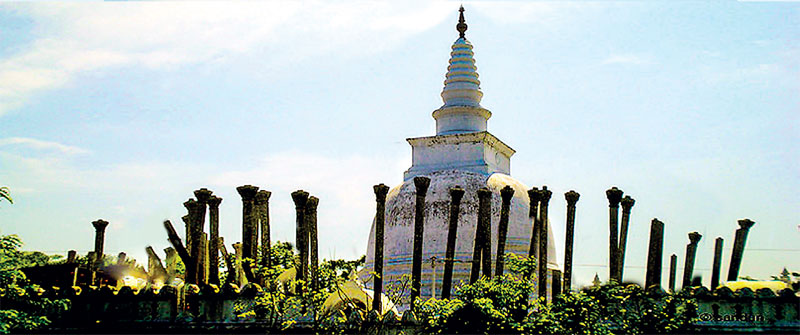
Information – Mahavansa
Devuni Goonewardene
















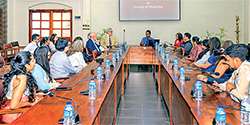



















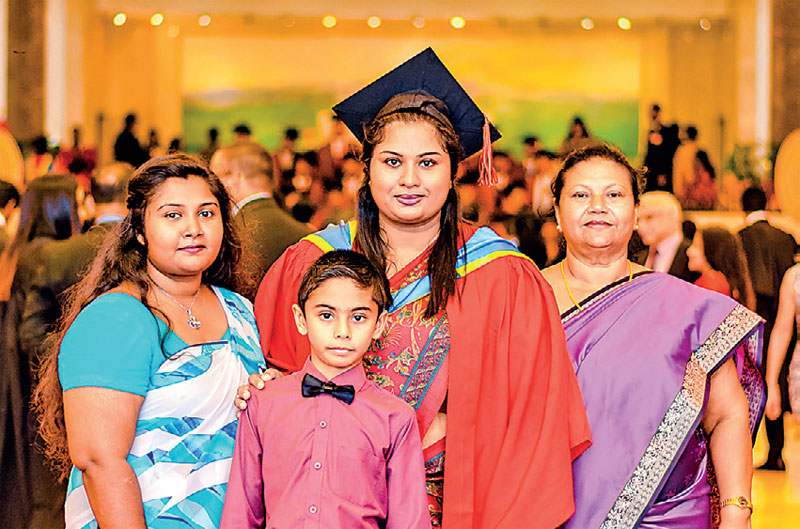

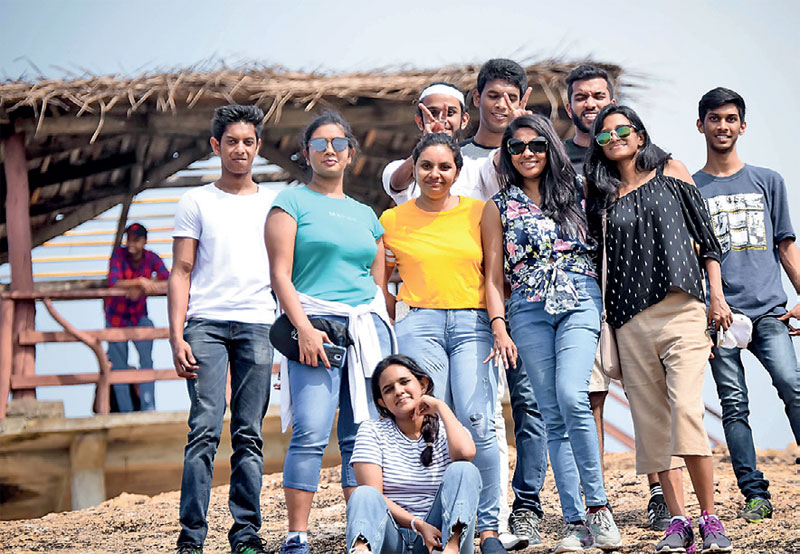
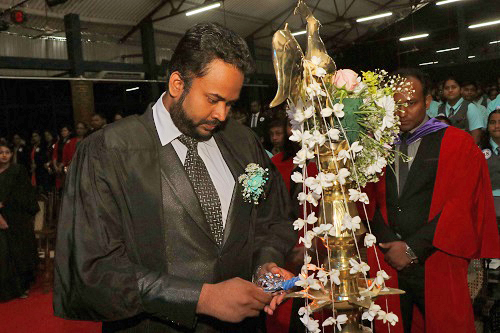

.jpg)
.jpg)
.jpg)
.jpg)

.jpg)
